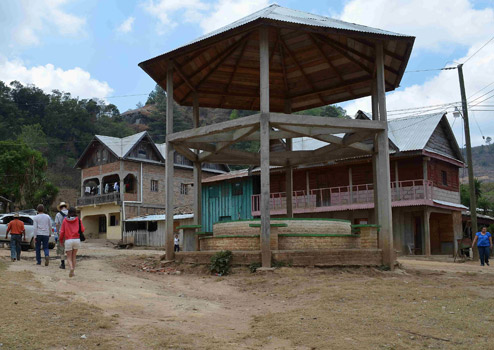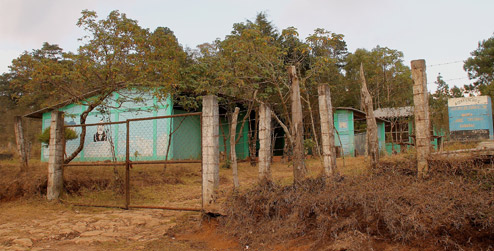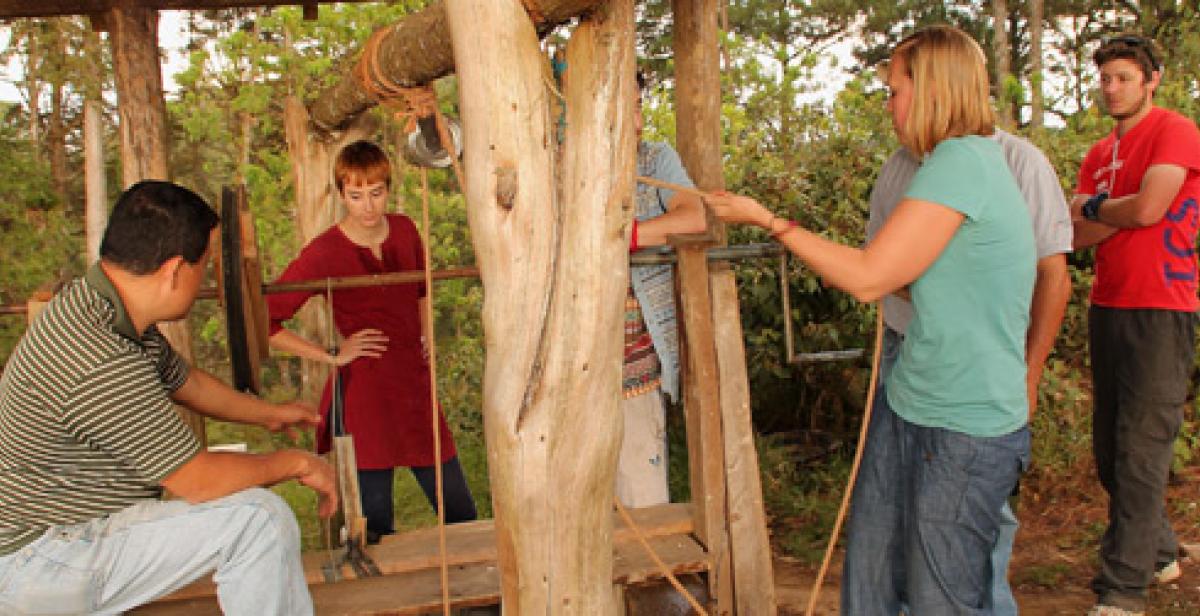The signpost states 20km to El Salvador and 11km to Nahuaterique when we reach the T-junction at the end of the one piece of road that leads towards our destination. We turn right over turbulent terrain and commence along the mountainous path leading us away from the border. The border has not always existed in its current position, and in fact the people of Nahuaterique have not always been called Hondurans. Later on that day, whilst having a discussion over funding for education and the politics surrounding the Nahuaterique people, Marco Antonio Pérez Ventura, a local school principal told us:
“The land is Honduras, but not the people”

(the picture above shows the town square).
Due to ill-defined boundaries between the two countries during the colonial period the border dispute arose after their independence from Spain in 1823. The two countries argued over approximately 300 square miles of the shared border until tensions climaxed with what became known internationally as the ‘Soccer War’ in July 1969, when over 2,000 people lost their lives.
Salvadoran peasants began migrating into Honduras in the 1920's, initially settling along the country´s common border as land in El Salvador was rapidly becoming unavailable. Over the next 40 years the people occupying these areas grew and moved deeper into Honduran territory, but the Salvadorans never attempted to claim title of the lands or apply for Honduran citizenship.
Unfortunately, new land reforms in Honduras displaced these people in the early 1960s and the Honduran administration began to evict the Salvadorans from land they had held for two generations, instead assigning it to Honduran peasants. By the late 1960s, internal pressures on the Honduran administration to uphold these reforms forced the government to demand repatriation of these peasants to El Salvador. Although the ruling elite in El Salvador refused this forced removal of the peasants on moral grounds, their motives almost certainly were defined by the scarcity of land resources at the time.
In 1969, Honduras exacerbated already high tensions by blocking the exit of fleeing Salvadorans, to which the Salvadoran government responded by cutting all diplomatic relations. And tensions finally spilled over when in July 1969, El Salvador played Honduras in two World Cup qualifying football matches - a sure way for nationalistic beliefs and old rivalries to emerge to the surface.
Although the war only lasted 4 days, as previously mentioned, over 2,000 people died (mostly Honduran) and a further estimated 60,000-130,000 peasants finally returned to El Salvador. This unfortunately then caused mass interior stresses that led to the Salvadoran civil war in 1979. A ceasefire was called on 20th July 1979, but it was not until October 30th 1980 that U.S president Jimmy Carter orchestrated an agreement that sent the dispute to the ICJ (International Court of Justice) at The Hague. And yet another 12 years passed before the court ruled in favour of Honduras in 1992 and thus stranded thousands of peasants who had Salvadoran heritage, but who would now have to call themselves Honduran.
That was 21 years ago.
Now, the bumpy 11km road to Nahuaterique which took us an hour to traverse is a graveyard of failed international aid and poses as a microcosm of Honduras´ contemporary problems. The road itself originally received funding for machinery, materials and resources from a town in El Salvador, but like the Nahuateriquan people, it has now been abandoned and forgotten. Every time a new election takes place, new pledges are made for funding, welfare and development, but as a lot of the people residing in the area are still not citizens and cannot vote, politicians often fail to keep their word. This means mistrust of the government and outside organisations have built up after so many unfulfilled promises. The E.U even started several projects, but pulled the plug before completion and several telephone masts are scattered around which are no longer maintained and so the signal has now dropped. Everyone has deserted these people, with the exception of the military who keep a stringent eye on the locals.
One way in which life could be considerably improved would be to legally grant Nahuaterique the status of a municipality so that the people could receive the same basic standards as the rest of Honduras. On arrival, we were told by some of the more vocal members of the community that as a municipality the Honduran government would no longer be able to ignore the most pressing issues facing the people such as education, infrastructure, employment and medical supplies.
As it stands, there are approximately 15 schools (one can be seen in the picture below) which are ill supplied with furniture, textbooks, equipment and teachers, with one medical centre that has no official doctor or resources to help the 8,000 people it is supposed to support. The lack of employment has raised another issue because with no jobs the people simply need some source of income and have resorted to the illegal logging and smuggling of timber into El Salvador. This is clearly not a satisfactory solution and further increases tensions between the two nations, but with no jobs this is the only option some have to make money in order to feed their families.

Despite reaching the requirements to become a municipality in areas such as its physical size and population their demands have fallen on deaf ears in the capital of Tegucigalpa. After 17 years of campaigning that their economic and social development is dependent on becoming a municipality, the people of Nahuaterique have taken matters into their own hands and so held their own elections. They have set up a council consisting of 21 members and a provisional mayor so that local issues can be addressed. This is a forum where those who previously have not been heard have a voice. Obviously the mayor has no official power and he is not recognised by the Honduran government, but having a union helps these people organise and communicate their ideas. The next step will be to get the rural people who survive with no water or electricity and are often isolated and forgotten to be represented and heard on a national level.
Progressio has been supporting the Nahuaterique people since 2009 by providing expertise in some critical areas such as agro ecology, environment and development. With this in mind, Progressio has already provided farmers with seeds and tools, a training facility and thus training for locals on issues such as organic fertilisers, sustainability and the use of chemical products. Alongside this, Progressio has contributed financially by helping set up a women´s rural bank that provides loans which have very low interest rates for projects that the committee selects. One of the mandates of Progressio is to focus on women and work with schemes that encompass their ideas; here women were previously discriminated against but now they can be more independent and have greater stability.
The other area in which Progressio has tried to make a difference is by using their international recognition to campaign in the political sphere on behalf of the Nahuaterique people. However, three years of hard work seems to have been to no avail when on ´Friendship Day´ here two weeks ago the vice-minister of External Affairs, Salome Castellanos stated:
“I think that the request of the creation of a municipality is really difficult, because of the circumstances in which we are. People from Nahuaterique have to forget about the creation of a municipality.”
This was obviously a major blow to the villagers who again feel like their plight is going unnoticed and their struggle is being deliberately ignored because of their ancestry. The people of Nahuaterique were kind to us and trusted us with their story; all they asked in exchange was that we too did not forget them.
Progressio ICS volunteer James Martin writes about Nahuaterique.
Photos by Progressio ICS volunteers Liv Ferrari and Lorena Cotza.




Comments
An excellent post on a
An excellent post on a difficult topic Jimmy. Well done!
yes and this Honduran people
yes and this Honduran people had abandoned this people for more of 20 years fighting for this lands they belongs to El Salvador shame for ICJ they gave to them this lands for what for this abandoned this peoples this government they do not want to help them because they think still Salvadorean people and they are selfish peoples Honduran they hate this pepoles see no education,no health care no electricity,roads nothing so if they want and need anything they have to go to el salvador because they do not have help or nothing from this government.